many aspects of Japanese life and culture, they are
surprised to learn that American Bluegrass/Country
music is not only alive, well and thriving in the land
of the Rising Sun, but has become an integral
part of Japanese culture itself.
Living in a suburb of Chicago, it's often difficult to
find a venue where I can hear that good old country
music played but frequent visits to Japan (my wife*s
native country) help satisfy my appetite for the music
Ive enjoyed tapping my toes to ever since childhood.
Many Bluegrass/Country music festivals are held
throughout Japan all during the year. One of my
favorites is a big weekend festival, held twice yearly
(April and November) in the city of Karuizawa (two
hours north of Tokyo). The setting is a golf/country
club in a beautiful mountain resort region and I try to
make at least one of those get togethers every year
(some years I manage to attend both).
Since I'm usually one of the few non-Japanese
("gaijin") in attendance, I'm sometimes invited to
join in and sing a song and I must confess, I don't
have to be asked twice or have my arm twisted!
Although my vocal abilities are certainly no match
for some of the "high-lonesome" Japanese
tenors, but my enunciation of the English
language is a dead on killer!
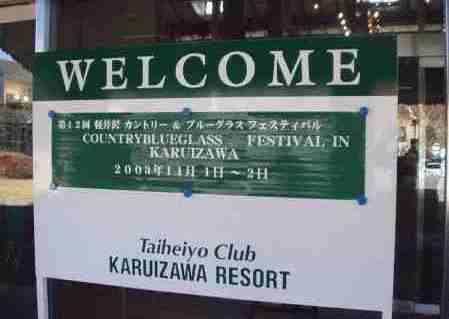
With apologies to Roy Acuff, that's yours truly at
the mike bringing the "Wabash Cannonball" home.
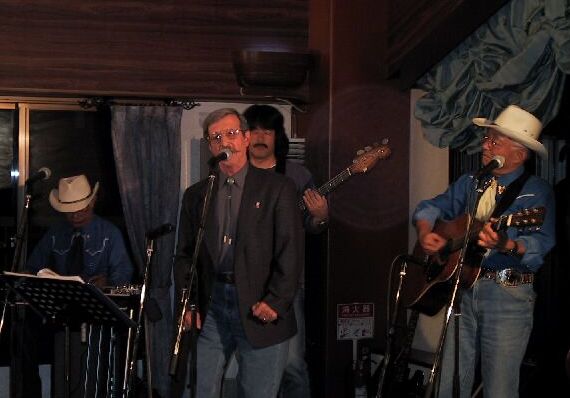
nourished by the songs and tales of settlers who
came to America in the 18th and 19th centuries.
Their music, "folk music," told the story of their
hardships, joys and sorrows in carving out new
homes in the unforgiving American wilderness.

Kyushu city of Fukuoka, has a special interest in
the songs and musical instruments of that time. His
instrument is the guitar but he is equally proficient
on banjo and dulcimer. His plaintive, ringing vocals
are true representations of "songs of the folk!"
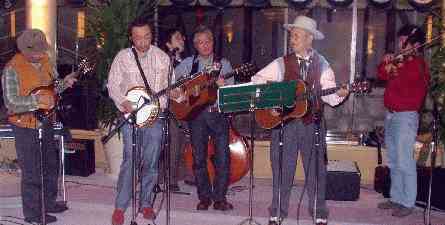
August of 2011, and who often drove me back to
my Tokyo hotel in his "Big Ben" (once a London
taxi cab) headed up a fine six piece bluegrass
band called "Weeping Grass." Takahashi-san's
group was closely styled after the Lester Flatt/
Earl Scruggs "Foggy Mountain Boys" band and
Takahashi-san himself was a sort of Japanese
"Lester Flatt." He probably knew every song that
Lester and Earl ever recorded; as a matter of fact,
in honor of Mr. Flatt, Takahashi-san ordered that
pricey Stetson hat from the U.S. which he wore
with pride. His gentle nature and sweet voice
will be sorely missed by all who knew him.
Yasushi, the elder (guitar - b.1931)
Hisashi (mandolin - b.1933)
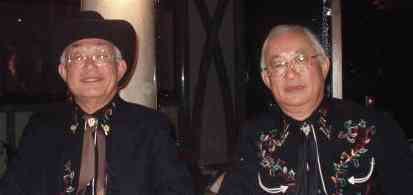
for more than sixty years and are quite well known
in country music circles there.
Before they were even born, their father, while
studying in the U.S. during the 1920's became a
fan of American jazz and he returned to Japan
with a collection of jazz and country music
recordings. It was from this collection, years
later, that the country music songs were to
have a special appeal for the two young
Ozaki boys, shaping their musical tastes.
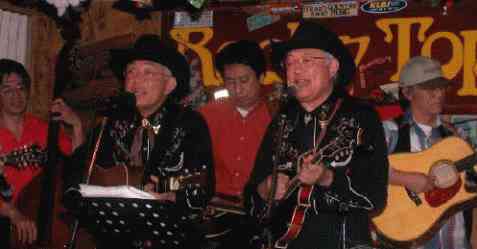
While World War II was still in progress, the two
young brothers listened to the country music
records and memorized the songs. Soon after
the war ended in 1945, the brothers learned to
play guitar and mandolin and went around to
U.S. army bases in Japan, performing for the
G.I's. You can imagine the reception these two
young Japanese boys received from the troops
as the young Hisashi picked and yodeled his
way through "Columbus Stockade Blues"
with Yasushi accompanying on guitar.
In the 1950's the Ozaki brothers billed themselves
as the "East Mountain Boys" (taking the name from
the mountains ringing their hometown of Kyoto) and
performed on a morning radio show in Kyoto.
Here is a photo of that time:
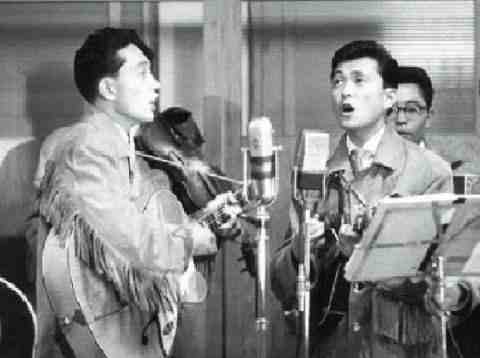
every southern gospel song you could name and
they're well known throughout central Japan
for performing the old gospel tunes.
They came to visit me a few years ago and my son
and I took them to a club in Chicago where, after
talking to the leader of the semi-country band
performng that night, the brothers were invited
on stage to do a few songs and "Columbus
Stockade" once again brought down the house!
In 2009, the Ozaki brothers received recognition
as "Pioneers of Bluegrass" by the International
Bluegrass Music Museum in Owensboro, Kentucky.
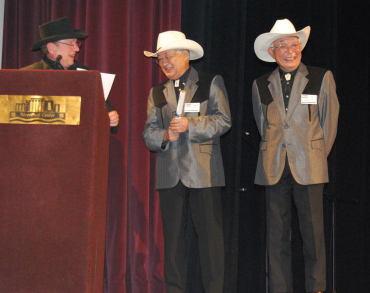
In the Ginza section of Tokyo, there are two fine
bluegrass/country music clubs, "Nashville" and
"Rocky Top"(where drinks are ordered as often by
the bottle as by the glass). Here are the Ozaki
brothers in my favorite club,"Rocky Top" (there's
a bottle of Jack Daniels with my name on it behind
the bar and you can usually find me there most
nights when in Tokyo). The place seats about
sixty, a full house, packed to the walls!
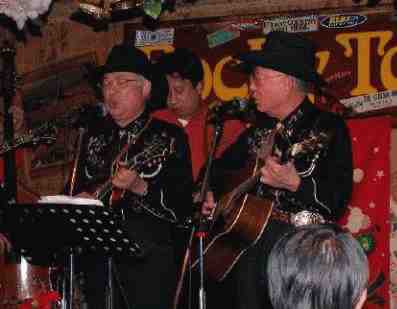
Shown here is the width of the entire stage which
is also the exact width of the club - the room
extends back from the stage about 30 feet.
This gives you a rough idea of its size; very
intimate as are most such clubs in Japan.
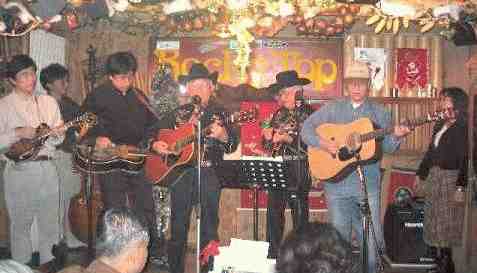
The
fellow picking the Martin D45 guitar, Masao Sasabi
(architect by day), is one of the finest bluegrass singers
in Japan and heads up two bands, "New Apple Seed"
and "General Store." For three years running,
Sasabi-san has been invited to perform at
the bluegrass festival in Guthrie, Oklahoma.

weekends at "Kon Ton Kan," a coffee house in
western Tokyo. They're called "Tetsu Kabuto"
which translates as "Steel Helmet" and their
repertoire ranges from "Earl*s Breakdown,"
"Fireball Mail," and "Daybreak in Dixie" to
early jazz numbers such as "Jada," "Lady
Be Good," "Nagasaki" and even to a mind
blowing version of "Caravan" featuring
some truly fantastic mandolin work.

bands and the musicians all have day jobs; they
play for pure enjoyment and nothing else! In these
days, that in itself is refreshing and believe me,
it comes across in their music! No matter where
you hear it played, in Tennessee, Chicago, cities
in Europe or Japan, for me there's an honesty
and sincerity to country and bluegrass music
that comes across loud and clear and nowhere
do I find this more evident than in the intimate
"hole-in-the-wall"clubs and pubs of Japan.
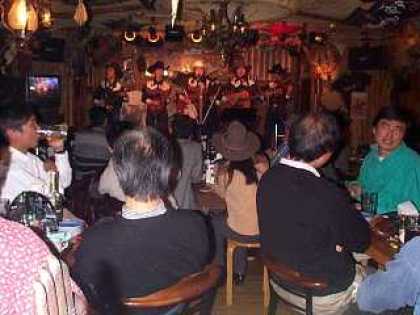
 ~ NEXT ~
~ NEXT ~
